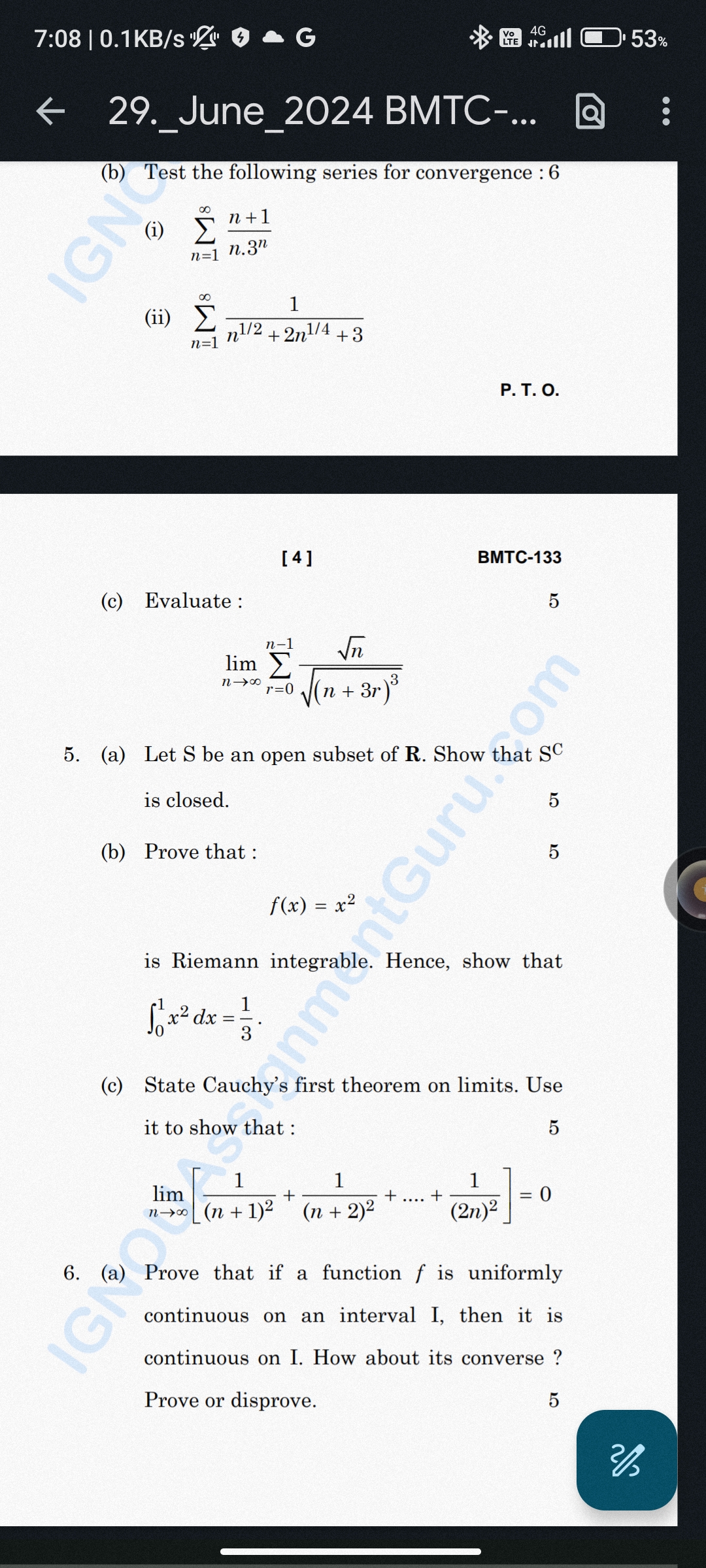Test the following series for convergence: (i) ∑(n+1)/(n·3^n) from n=1 to ∞ and (ii) ∑1/(n^(1/2) + 2n^(1/4) + 3) from n=1 to ∞. Also, show that the complement of an open set S in R... Test the following series for convergence: (i) ∑(n+1)/(n·3^n) from n=1 to ∞ and (ii) ∑1/(n^(1/2) + 2n^(1/4) + 3) from n=1 to ∞. Also, show that the complement of an open set S in R is closed, and prove that the function f(x) = x^2 is Riemann integrable.

Understand the Problem
The question is asking to evaluate the given series for convergence, specifically focusing on two series expressed in summation form and requiring proof regarding properties of Riemann integrability and limits.
Answer
First series: converges; Second series: diverges; Complement of an open set is closed; $\int_0^1 x^2 \, dx = \frac{1}{3}$.
Answer for screen readers
- The first series converges.
- The second series diverges.
- The complement of an open set is closed.
- The function $f(x) = x^2$ is Riemann integrable, and $\int_0^1 x^2 , dx = \frac{1}{3}$.
Steps to Solve
-
Testing the first series for convergence
We analyze the series: $$ \sum_{n=1}^{\infty} \frac{n+1}{n \cdot 3^n} $$
We can simplify the term: $$ \frac{n+1}{n \cdot 3^n} = \frac{n}{n \cdot 3^n} + \frac{1}{n \cdot 3^n} = \frac{1}{3^n} + \frac{1}{n \cdot 3^n} $$
This means we can evaluate the convergence of each part:
- The first part, $\sum_{n=1}^{\infty} \frac{1}{3^n}$, is a geometric series with $r = \frac{1}{3}$, which converges.
- For the second part, we can use the comparison test with $\sum_{n=1}^{\infty} \frac{1}{3^n}$, recognizing that $\frac{1}{n \cdot 3^n}$ converges because $\frac{1}{3^n}$ dominates $\frac{1}{n \cdot 3^n}$ for large $n$.
Therefore, the first series converges.
-
Testing the second series for convergence
Now we evaluate: $$ \sum_{n=1}^{\infty} \frac{1}{n^{1/2} + 2n^{1/4} + 3} $$
For large $n$, the term $n^{1/2}$ dominates, so we can approximate: $$ n^{1/2} + 2n^{1/4} + 3 \sim n^{1/2} $$
Thus, we examine: $$ \sum_{n=1}^{\infty} \frac{1}{n^{1/2}} $$
This series diverges since it is a p-series with $p = \frac{1}{2} < 1$. Therefore, by the limit comparison test, the original series diverges.
-
Proving the complement of an open set is closed
Let $S$ be an open subset of $\mathbb{R}$. The complement $S^c$ consists of all points in $\mathbb{R}$ not in $S$.
To show that $S^c$ is closed, we must show that it contains all its limit points. If a point $x$ is a limit point of $S^c$, then every neighborhood of $x$ contains points not in $S$. Since $S$ is open, there must exist an interval around points in $S$, meaning $x$ cannot be in $S$. Thus, $S^c$ contains all its limit points, showing it is closed.
-
Proving the function is Riemann integrable
The function $f(x) = x^2$ is continuous on the closed interval $[0, 1]$. A fundamental theorem states that continuous functions on closed intervals are Riemann integrable.
Therefore, we can compute the integral: $$ \int_0^1 x^2 , dx = \left[ \frac{x^3}{3} \right]_0^1 = \frac{1}{3} $$
- The first series converges.
- The second series diverges.
- The complement of an open set is closed.
- The function $f(x) = x^2$ is Riemann integrable, and $\int_0^1 x^2 , dx = \frac{1}{3}$.
More Information
- The comparison test is useful for determining the convergence of series.
- Continuity ensures Riemann integrability in the context of integrable functions over closed intervals.
Tips
- Misapplying the comparison test by not recognizing when a series diverges.
- Confusing open and closed sets when discussing their complements.
AI-generated content may contain errors. Please verify critical information